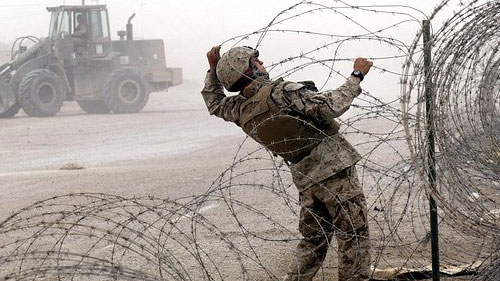One of the many problems facing the public these days is insidious: the misuse of language to obscure meaning. Let’s take a look at an example, two phrases used by people with opposing views on the United States’ involvement in the insurgency / civil war / emerging caliphate in Iraq:
Redeploy / Cut & Run
The current war / occupation / police action in Iraq has become deeply unpopular, with a dwindling supply of heady triumphs and a steady stream of dismal news. Reports of bombings against military and civilian targets have become a disheartening echo of the media drumbeat that lead up to the invasion back in 2003. Increasingly public debate has shifted to the discussion of how American soldiers, marines, sailors, and airmen are going to be removed from the combat area. As the combat area can be loosely described as “Iraq in its entirety,” we see the repeated use of euphemisms to describe the various plans.
To cut and run is literally when the crew of an entangled ship cuts loose any moorings or anchors that hold it fast in order to get clear of some imminent danger. Those who advocate remaining actively engaged in combat in Iraq have frequently labeled any opposition as a “cut and run” strategy. This plays upon the prideful view most Americans hold of our military. The image of our soldiers fleeing the battlefield is a strong motivating factor for many who lived through the turmoil of the Vietnam War, as well as those simply raised in a patriotic tradition that props up America’s general tendency to prevail in arms. We seem to place less value on soldiers that die on the losing side of a conflict, and fear consigning our recent war losses to such a status.
To redeploy is a pretty straightforward concept. We deployed our armed forced into Iraq (which is to say we invaded), and now many in the public arena would like to re-deploy them back out of Iraq (which is to say they’d like to un-invade it). Traditionally this would involve retreating, surrendering, and acknowledging the victory of the enemy. To acknowledge the victory of the enemy is to acknowledge defeat. Defeat doesn’t play well, so opponents to the continuation of the Iraq War like to call retreat redeployment.
In fairness, most plans that bear the label “redeployment” involve swapping out American men and women with guns with Iraqi men with guns, so that the Iraqi men can win or lose for themselves (spoiler: their victory isn’t really part of the redeployment plan). This will let the Iraqi national government lose without America having to lose. This is similar to what large companies do when they outsource profits for tax purposes or outsource liabilities for their shareholder reports.
Please call it what it is: retreat. We can retreat and let Iraqi national forces take up our positions, or we can retreat and let tribal or insurgent or Al Qaeda forces take up our positions, but we’re talking about retreat here. Learn to swallow the pill, folks; we don’t have the political will to win this fight, so we’re talking about losing it.
Presumably-competent commanders like David Petraeus say it will probably take 9-10 years to properly stomp out the insurgency in Iraq. We can spend a decade pulling this band-aid off, or we can get it over with quickly. The decision is ours, and we shouldn’t delude ourselves about it one way or the other.
Definitions: civil war, insurgency, occupation, police action, redeploy, retreat, surrender, denial
If you’ve got any favorite terms that are being misused or twisted sideways, I’d like to hear about it.

I have two favorites: totalitarianism and fascism. The latter, because it is an ideology without and founding text or theory, lends itself towards confusion. But whether it is left-wing street protesters calling cops and government “fascists” or intellectual lightweights on the right describing fascism as essentially socialism, the F-word is everyone’s favorite for reducing argument to Godwin’s Law.
As for totalitarianism, I suspect most people simply don’t understand that it is a form of government that can arise from either the right or the left but in the end exists to preserve itself over anything else. Particularly disturbing is the tendency of neoconservative war hawks to describe states such as Iran as “totalitarian,” when the actual socio-political environment is far from it.
For further clarification of these terms (as well as communism) the best sources have always been Orwell and Hannah Arendt, hands down. My own humble musings can be found here.
Ah yes, I read that a couple weeks ago. Would have commented on it but for your draconian anti-spam mechanisms. Yes, I’m exaggerating with my use of that term.
The main uses of “totalitarianism” and “fascism” I hear these days are in combination with the Islamic Terrorist bogeyman. The new caliphate of the Islamo-fascists (whatever that means) will be a totalitarian terrorist state where our women will be horribly abused. In contemporary political rhetoric, it seems that many of these terms just mean bad: the new bad of the bad people will be a bad bad state where bad things happen. If you want to say that a radio talk-show demagogue is bad, you simply call him a fascist. It doesn’t matter if it’s Michael Savage or Mike Malloy, they’re “fascists” to their enemies.
I don’t hear “totalitarian” swung around quite so vigorously. I presume this is because more people understand what it means and know that most credible figures in the American public arena aren’t interested in it.